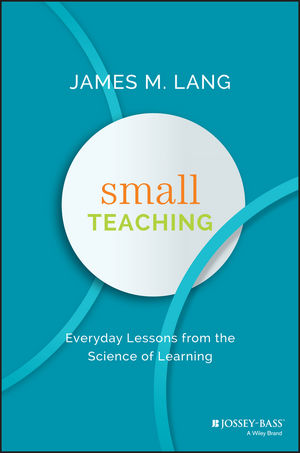Small Teaching: Everyday Lessons from the Science of Learning by James M. Lang
Join us at the CITL Book Club to read James Lang’s excellent book on science learning! We will meet three times throughout the semester to discuss this book and ways we can tie the information to our own teaching. Participants will be provided a copy of the book, but must be able to attend all three meetings.
Registration is now closed.
Time: Thursdays from 3:00-4:30pm
Dates and Readings:
Thursday, February 20th: Section I Knowledge (84pp)
Thursday, April 2nd: Section II Understanding (76pp)
Thursday, April 30th: Section III Inspiration (85pp)
“In a time when numerous books on college teaching appear each year, Lang’s stands out for its ability to genuinely engage a wide audience of readers. Whether new teachers or experienced award-winners, readers from any field will find valuable insights in Lang’s work.”
-Daniel Guberman, an Instructional Developer in the Center for Instructional Excellence at Purdue University Currents in Teaching and Learning, Vol.11, No.1, August, 2019
From the Publisher
Employ cognitive theory in the classroom every day Research into how we learn has opened the door for utilizing cognitive theory to facilitate better student learning. But that’s easier said than done. Many books about cognitive theory introduce radical but impractical theories, failing to make the connection to the classroom. In Small Teaching, James Lang presents a strategy for improving student learning with a series of modest but powerful changes that make a big difference—many of which can be put into practice in a single class period. These strategies are designed to bridge the chasm between primary research and the classroom environment in a way that can be implemented by any faculty in any discipline, and even integrated into pre-existing teaching techniques. Learn, for example:
- How does one become good at retrieving knowledge from memory?
- How does making predictions now help us learn in the future?
- How do instructors instill fixed or growth mindsets in their students?
Each chapter introduces a basic concept in cognitive theory, explains when and how it should be employed, and provides firm examples of how the intervention has been or could be used in a variety of disciplines. Small teaching techniques include brief classroom or online learning activities, one-time interventions, and small modifications in course design or communication with students.

